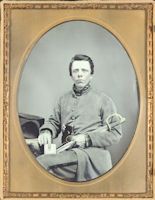Headquarters Third Brigade, Berlin, Md.,
Friday, July 17, 1863.
Dear Friends at Home:—.
I have received several letters from you lately, but have had no opportunity of answering them till now. I sent you a leaf from my memorandum book from the field of Gettysburg on the 4th, just to say I was safe, and I hope you received it. A citizen said he would take it to York. Since then we have been on the move constantly. I have not seen my portfolio till this morning, and had nothing to write on if I had had time.
The past three have been eventful weeks and I begin to hope the back of the rebellion is broken. If the Mississippi had any special relation to the monster, it certainly is, for yesterday we received official information that the river was open. At Gettysburg I think we broke the ribs on one side. At all events we came nearer to it than we ever did before. Oh, that was a terrible fight! I rode over a great part of the ground on the left, on the 5th, and of all the carnage I ever saw that was the most horrible. All over the field were scattered black and bloated corpses of men and dead horses, wrecks of caissons and gun carriages. I was galloping along the road when all at once my horse sprang to one side, and looking to see what started him, I saw the bodies of thirteen rebels lying in the mud with the pitiless rain beating on their ghastly faces. That would have been a horror at home; there it was only a glimpse of what might be seen. The rebels seemed to have left all their dead, while ours were buried immediately, and the wounded all removed that could be, by the night of the 4th. Colonel Vincent died on the 7th, as brave and gallant a soldier as ever fell. His commission as Brigadier General was read to him on his death-bed. His loss is felt deeply by the brigade. There is no one to fill his place. No one here can march a brigade as he could. He had less straggling, less of everything evil and more of everything good than any other brigade in the division. Oh, how we loved him! But he is gone.
Colonel Rice, now in command, is known as “Old Crazy,” as Colonel Stockton was “Jack o’ Clubs.” He is brave enough, but in a fight too excitable to do anything right.
We followed the rebs as fast as possible to Williamsport, but while we thought they were fastened, they again got away from us, and now we cannot catch them this side of Richmond. We are on the Potomac four miles below Harper’s Ferry, and here we must rest a few days.
The men have pressed on since the fight, barefooted, hungry, lousy and faint, animated by the hope of giving Lee his finishing blow. The horses are worn out, every day’s march killing from five to twenty in each battery. They must rest and be shod up before we can go on. I said the men were lousy. You hardly know what that means, but if you were in the ranks you would, not head lice, but body lice, that crawl all over shirts and pants. Nothing but boiling will kill them, and for three weeks no one has had a chance to boil a shirt. For eleven days and nights I did not take off my shoes to sleep.
Well, I must close. I have a dozen letters to write and my clothes to wash. If we stay here long enough I will write again, but whether you hear from me or not, write as often as you can. I saw Conway Ayres yesterday and Alf the day before, both well. Love to all.






